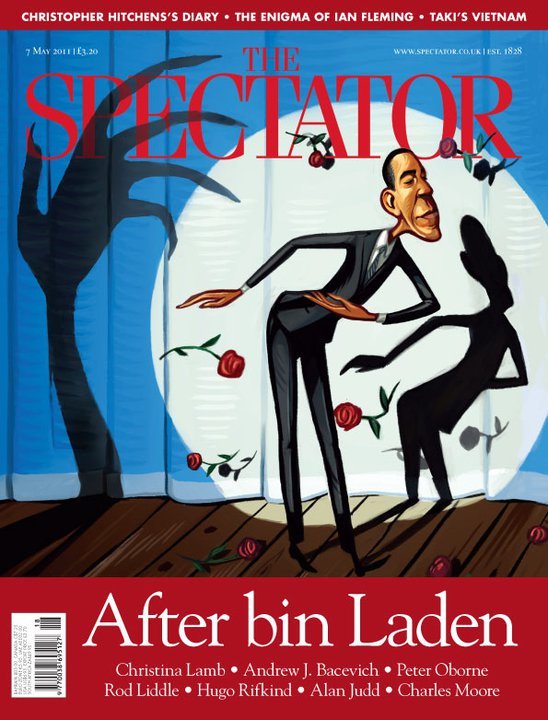A second excavation from our archives today, and another article by Christopher
Hitchens. It is, we now know, the last he would ever write for us: a Diary column dispatched from the States earlier this year on the occasion of Osama Bin Laden’s death.
I abhor the idea of taking a mobile-phone call at the dinner table but my friend Douglas Brinkley, eminent historian and editor (of Ronald Reagan and Hunter Thompson alike) has three small children and when his wife calls he rightly answers. So on Sunday night in Houston, Texas, at the home of the bountiful Michael and Nina Zilkha, we got an early notice that the President would soon be on the air. I have lived in Washington long enough to know that presidents do not break into weekend TV to bring bad news: only to react to very bad news, or to claim credit for something worthwhile. I can therefore claim to have guessed right away that either Osama bin Laden was in custody, or had achieved his goal of martyrdom.
I remained deep in the heart of Texas for the next two days, and didn’t come across any gung-ho celebrations. Had I been in DC, I would only have gone down to Lafayette Square out of curiosity. On screen, the event had a College Republican look to it: the only placard waved read ‘Bush/Cheney 2004’. The most striking thing was the age of the participants: most must have been in high school a decade ago. Perhaps the national disease of amnesia isn’t as prevalent as some people believe.
It used to madden me, back in 2001, when craven commentators were so fond of saying that even if bin Laden was killed, many more jihadists would ‘spring up in his place’. This weak fatalism ignores many things, not least the effect of jihad in recruiting brave Americans to the side of resistance. I know several people who immediately gave up a great deal to join the armed services. Matt Pottinger, for example, finished watching the obscene video of the butchering of Daniel Pearl and left his job at the Wall Street Journal to join the Marines. He later helped sponsor
an all-female unit within the Corps, trained to work with Afghan women. He was radicalised: this process is not a one-way street. Look at the calibre and humour and bravery of the Seals, and ask yourself if the sadistic riff-raff of the suicide-murder faction have anything to compare with them.
Did we torture our way into bin Laden’s lair? The answer seems to be no. It was the assiduous cultivation of a single source that did the job. The defence of illegal methods of interrogation falls apart as soon as it is offered. Dick Cheney wrote in so many words that 9/11 found the United States bereft of any real intelligence on the not-so-new foe. Thus, torture is a prima-facie admission of failure, coupled with an attempt to make up the deficit by strong-arm tactics. Other strong objections to one side, this approach would lead very fast — did lead very fast — to a banana-republic intelligence system. Diminishing returns kick in with terrible speed. Hard work and high morale put an end to the life of Pakistan’s most famous legal immigrant.
As soon as I saw ‘Abbottabad’ on the captions, and heard its pronunciation mangled, I knew who this immigrant’s hosts had been. I’ve visited that charming region, where the tradition of the ‘hill station’ is lovingly kept up by the Pakistani army. If you follow the Murree Road you come to Muzzafarabad, which I seem to remember is one of the settings for Paul Scott’s Raj Quartet. As so often, a slight knowledge of the imperial past is handy for analysing the modern world.
Would it be decent or prudent to publish the photographs of bin Laden’s cadaver? I have twice been in countries where people refused to believe that the tyrant was gone. In Romania in 1989 I helped hand out freshly printed Hungarian newspapers (this was in Transylvania province, celebrated for its supernatural potentates) that showed the corpses of Nicolae and Elena Ceausescu. The looks of relief, slowly replacing incredulity, were well worth seeing. In Iraq in 2003 — a nation where citizens had thought Saddam Hussein even knew what they were dreaming — I saw
Paul Wolfowitz briefly lost for words when he was asked at a public meeting to say where the Americans were hiding the fallen despot. Again, the later death-shots of Saddam, and of his ghastly progeny, had an almost exorcising effect. In the case of bin Laden, no such shock tactics seem necessary. There will in any case always be fanatics who maintain that the whole thing is a hoax. Some jihadist websites are already saying so. Let them by all means persist with this delusion, too.





Comments